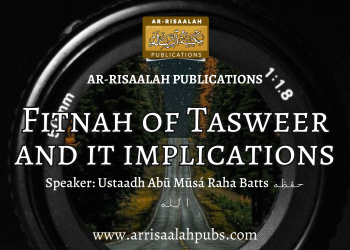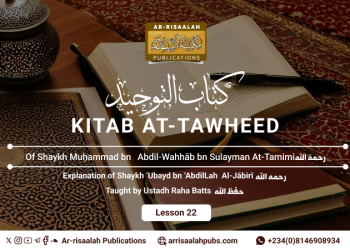All praise is due to Allāh, the Lord of the worlds. And may He extol the Messenger ﷺ in the highest company of Angels, and grant him peace, likewise to his family, Companions and those who follow him until the Day of Resurrection.
Kitāb At-Tawḥīd
Book of Imām Muḥammad bn ʿAbdil-Wahhāb bn Sulaymān At-Tamīmī رحمه الله
Explanation of Shaykh ʿUbayd bn ʿAbdillāh al-Jabirī رحمه الله
Taught by Ustādh Raha Batts حفظه الله
Points discussed during the class:
Prophet Ibrahim عليه سلام fear of Shirk for us offsprings.
Hadith regarding Shirk al-Asgar.
The advice of Sufyan at-Thawri to his student.
The affair of ar-Riyaa.
The forms Riyaa occurs in actions.
Praising a person to their face.
Riyaa’ and Sum’ah.
The weeping of Sufyan at-Thawri.
The narration of ibn Ma’sud – the one who dies while associating partner with Allāh.
The speech of ibn Ma’sud regarding Shirk.
A form of shirk – supplicating to other than Allāh.
The categories of those who commit Shirk.
The affair of those who negate Rububiyyah for Allāh.
Question asked:
My mother and my father (he is muslim and he confirm that I am her child) was not married when I was born and they separated later. I just want to know; when I got married years ago, my father was my wali, so was my nikkah compliant? Also, my father got married with another woman and they have a boy (my step brother). Do I have rights regarding my father and my step brother? I know that a lot of scholars would say that he is not my father in Islam.











